Comprehensive Guide to AI Voice Translation for Spotify Podcasts
If you're tuned into the world of podcasting, you've likely noticed the buzz around Artificial Intelligence (AI) and how it's reshaping the audio landscape. One of the most exciting developments is AI voice translation, which is revolutionizing how podcasters connect with global audiences. Let's dive into how this technology is being used on Spotify podcasts, explore its benefits, weigh the potential drawbacks, and peek into the future of audio accessibility. We'll also look at real-world applications and share tips on how podcasters can use AI to amplify their reach and impact.
Understanding AI Voice Translation in Podcasting
What is AI Voice Translation?
AI voice translation is a fascinating blend of technology that converts audio content from one language to another, all while keeping the original speaker's voice intact. This isn't just about translating words; it's about capturing the essence of the speaker's tone, intonation, and even their unique vocal quirks. Imagine being able to listen to your favorite podcast in your native language, with the host's voice sounding just as familiar. That's the power of AI voice translation.
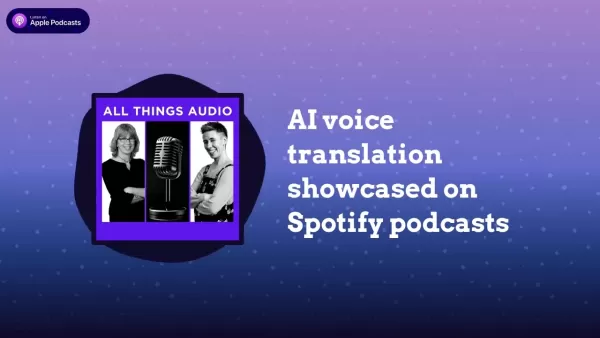
This technology harnesses machine learning algorithms to dissect speech patterns, understand nuances, and recreate the audio in a different language that feels personalized and seamless. It's a game-changer for podcasters looking to break down language barriers and engage with listeners worldwide.
The key components driving AI voice translation include:
- Speech Recognition: This is where the magic begins, with AI accurately transcribing spoken words into text. Precision here is crucial to ensure the translated output is spot-on.
- Machine Translation: Here, sophisticated algorithms take over, translating the text into another language. The best systems now incorporate contextual awareness for translations that sound more natural.
- Voice Cloning: This step is where the speaker's voice is replicated, preserving unique traits like tone, pace, and accent. It's what makes the translated audio sound like the original speaker.
- Audio Synthesis: The final piece of the puzzle combines the translated text with the cloned voice to produce the audio output. Advanced synthesis techniques help avoid the robotic sound that can sometimes creep in.
With these technologies working in harmony, AI voice translation is poised to transform content creation and distribution, especially within the podcasting realm.
AI's Role on Spotify Podcasts
Spotify, a titan in the podcasting world, has started to incorporate AI voice translation, signaling a significant leap forward in audio content accessibility. By automatically translating podcasts into multiple languages, Spotify is opening up a world of content to millions of new listeners. This is a goldmine for podcasters aiming to expand their global footprint.

Here's how AI is enhancing Spotify podcasts:
- Automatic Subtitling: AI generates real-time subtitles, making podcasts more accessible to those who are deaf or hard of hearing.
- Multilingual Content: Existing podcasts are translated into various languages, broadening their global reach.
- Voice Enhancement: AI can improve the audio quality of older recordings, bringing them up to modern standards and making them more enjoyable for listeners.
Spotify's embrace of AI for voice translation showcases their dedication to globalizing content and enhancing accessibility, catering to the evolving needs of both creators and their audiences.
Navigating Ethical Considerations and Potential Challenges
The Ethical Landscape of Voice Cloning
While AI voice translation offers exciting possibilities, it's essential to tread carefully through the ethical minefield. Voice cloning, in particular, sparks debates over authenticity and the potential for misuse. Issues such as consent, ownership, and the risk of creating misleading content or deepfakes are critical to address.
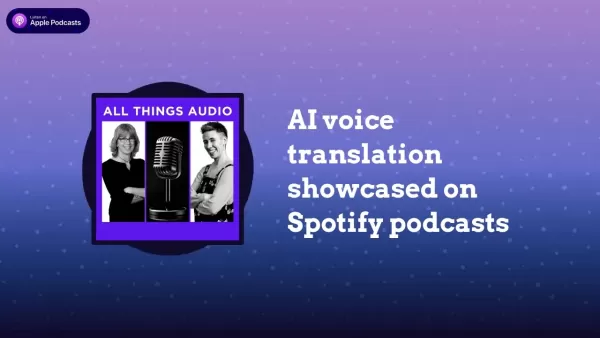
Key ethical considerations include:
- Informed Consent: It's vital to ensure that people whose voices are cloned are fully aware and have given explicit permission for their voices to be used.
- Transparency: Being open with listeners about using AI in voice translation helps maintain trust. It's important to clarify that what they're hearing is an AI-generated voice.
- Authenticity: There's a delicate balance between leveraging AI for convenience and preserving the genuine emotional connection of the original content.
- Fair Compensation: Developing models that ensure voice actors and translation professionals are fairly compensated for their contributions is crucial.
These ethical considerations demand thoughtful consideration and the establishment of industry standards to ensure AI is used responsibly in audio content.
Overcoming Technical and Logistical Hurdles
Scaling up AI voice translation across a broad platform like Spotify isn't without its challenges. Accuracy is king; even the slightest mistake can mar the listener's experience. Additionally, there are hurdles related to cost, scalability, and maintaining a consistent brand across different languages. Podcasters must weigh their resources carefully before diving into AI voice translation.
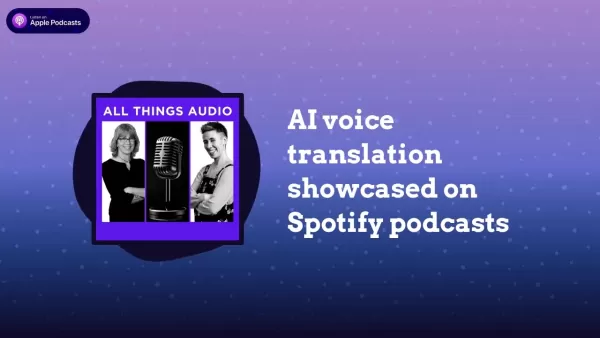
Some common challenges include:
- Accuracy: Ensuring that translations accurately capture the intended message and context of the original content is paramount.
- Cost: Balancing the expense of AI translation services against the potential increase in audience size and revenue is a critical decision.
- Scalability: Managing the translation and distribution of content across multiple languages without sacrificing quality is a significant challenge.
- Brand Consistency: Keeping a consistent voice and style across different languages helps reinforce brand identity.
Addressing these hurdles requires meticulous planning, thorough testing, and continuous monitoring to ensure AI voice translation is implemented effectively and ethically.
How to Use AI Tools in Your Podcast
Step-by-Step Guide to Leveraging AI in Podcasts
Ready to integrate AI into your podcasting workflow? Here's a detailed guide to get you started:
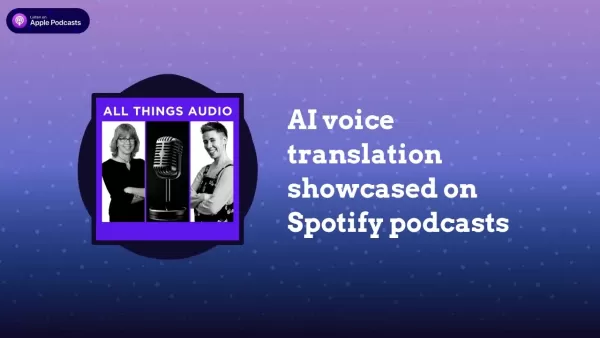
- Content Selection: Pick content that's suitable for translation. Evergreen topics tend to work best, as they remain relevant over time.
- Research AI Voice Translation Tools: Dive into the various tools available for automatic translation and voice cloning. Compare features and user reviews to find the best fit for your needs.
- Test AI Translation Services: Evaluate how well these tools capture the tone, humor, and emotion of your original content. This step is crucial for maintaining the essence of your podcast.
- Editing & Refinement: Once you have the translated audio, refine it with the help of experts to ensure accuracy and naturalness.
- Distribution: Roll out your translated podcast to targeted audiences, leveraging platforms like Spotify to reach listeners in different languages.
- Gather Feedback: Use polls and surveys to collect feedback from your audience. This will help you fine-tune the listener experience and make ongoing improvements.
Understanding Pricing Models for AI Audio Enhancement
Cost Factors Affecting AI Audio Solutions
When considering AI audio enhancement tools, several factors come into play that can influence the pricing. Understanding these can help podcasters make informed choices that balance features with financial feasibility:
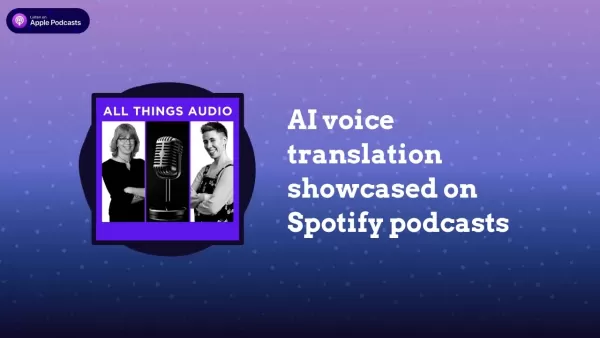
- Processing Power: High-end AI requires substantial processing power, which can drive up costs.
- Length of Audio Content: The longer your podcast episodes are, the more processing and the higher the cost.
- Extra Features: Additional features like transcripts and translations can add to the base cost.
- Transcription Complexity: Translating straightforward English is typically less expensive than tackling more complex languages or local dialects.
AI Voice Translation: Advantages and Disadvantages
Pros
- Increased Audience Reach: By overcoming language barriers, your podcast can connect with listeners worldwide.
- Cost-Effective: AI reduces the need for human translators, saving both time and money.
- Enhanced Accessibility: Your content becomes available to a broader demographic, including those who are deaf or hard of hearing.
- Time-Saving: Automating the translation process means you can focus on creating great content rather than managing translations.
- Scalability: Easily distribute your content in multiple languages without the logistical headaches.
- Better UI: Improved user interfaces make navigating and enjoying audio content easier.
Cons
- Ethical Concerns: The use of voice cloning raises ethical questions about authenticity and potential misuse.
- Translation Accuracy: There's always a risk of errors or misinterpretations in the translation process.
- Loss of Nuance: Conveying emotions and cultural context can be challenging for AI, leading to a loss of nuance in the translated content.
- Monotonous Output: AI-generated audio can sometimes sound robotic, which may detract from the listener experience.
Frequently Asked Questions
What is AI voice translation and how does it work?
AI voice translation uses artificial intelligence to convert audio content from one language to another, maintaining the original speaker's voice characteristics. It involves speech recognition, machine translation, voice cloning, and audio synthesis to provide a seamless and personalized listening experience. This technology helps podcasters reach global audiences by breaking down language barriers.
How does Spotify use AI voice translation in podcasts?
Spotify leverages AI to automatically translate podcasts into multiple languages, making content accessible to a global audience. Additionally, it generates real-time subtitles for those who are deaf or hard of hearing and enhances the audio quality of older recordings, improving the overall listening experience.
What are the ethical considerations of using AI for voice cloning and translation?
Ethical considerations include ensuring informed consent from voice donors, being transparent with listeners about using AI, maintaining the authenticity of the content, and providing fair compensation to voice actors and translation professionals. These steps are vital for upholding ethical standards and maintaining audience trust.
Are there any technical challenges associated with AI voice translation?
Yes, there are technical challenges such as ensuring accuracy in translations, managing scalability across multiple languages, and maintaining brand consistency. Addressing these requires careful planning, testing, and ongoing monitoring to implement AI voice translation effectively and responsibly.
What are some AI-powered tools that podcasters can use to improve their content?
Many AI-powered tools are available to help podcasters with various aspects of content creation, including content selection, AI voice translation, editing, distribution, and more. These tools can streamline workflows and enhance the overall quality of your podcast.
Related article
 AI-Powered Cover Letters: Expert Guide for Journal Submissions
In today's competitive academic publishing environment, crafting an effective cover letter can make the crucial difference in your manuscript's acceptance. Discover how AI-powered tools like ChatGPT can streamline this essential task, helping you cre
AI-Powered Cover Letters: Expert Guide for Journal Submissions
In today's competitive academic publishing environment, crafting an effective cover letter can make the crucial difference in your manuscript's acceptance. Discover how AI-powered tools like ChatGPT can streamline this essential task, helping you cre
 US to Sanction Foreign Officials Over Social Media Regulations
US Takes Stand Against Global Digital Content Regulations
The State Department issued a sharp diplomatic rebuke this week targeting European digital governance policies, signaling escalating tensions over control of online platforms. Secretary Marco
US to Sanction Foreign Officials Over Social Media Regulations
US Takes Stand Against Global Digital Content Regulations
The State Department issued a sharp diplomatic rebuke this week targeting European digital governance policies, signaling escalating tensions over control of online platforms. Secretary Marco
 Ultimate Guide to AI-Powered YouTube Video Summarizers
In our information-rich digital landscape, AI-powered YouTube video summarizers have become indispensable for efficient content consumption. This in-depth guide explores how to build a sophisticated summarization tool using cutting-edge NLP technolog
Comments (13)
0/200
Ultimate Guide to AI-Powered YouTube Video Summarizers
In our information-rich digital landscape, AI-powered YouTube video summarizers have become indispensable for efficient content consumption. This in-depth guide explores how to build a sophisticated summarization tool using cutting-edge NLP technolog
Comments (13)
0/200
![ScottJackson]() ScottJackson
ScottJackson
 September 25, 2025 at 8:30:37 PM EDT
September 25, 2025 at 8:30:37 PM EDT
스포티파이 팟캐스트 AI 보이스 번역 기능 진짜 유용하네요! 영어 팟캐스트 듣다가 자동으로 한국어로 번역되는 거 처음 경험했을 때 소름 돋았어요 ㅎㅎ 근데 아직 억양이 약간 어색한 부분이 있는 듯? 다음 업데이트에서 개선되길 바랍니다~


 0
0
![JoseJackson]() JoseJackson
JoseJackson
 August 26, 2025 at 9:01:17 AM EDT
August 26, 2025 at 9:01:17 AM EDT
This AI voice translation stuff for Spotify podcasts is wild! Imagine listening to your favorite show in any language without missing a beat. But, gotta say, I wonder if it’ll ever capture the host’s vibe perfectly—accents and all. Still, super cool tech! 😎


 0
0
![BruceBrown]() BruceBrown
BruceBrown
 August 8, 2025 at 9:00:59 AM EDT
August 8, 2025 at 9:00:59 AM EDT
AI voice translation for podcasts is wild! I love how it’s breaking down language barriers, but I wonder if it’ll ever capture the vibe of a host’s quirky accent perfectly. 🤔 Still, super cool for reaching global listeners!


 0
0
![RalphJohnson]() RalphJohnson
RalphJohnson
 April 24, 2025 at 10:45:43 PM EDT
April 24, 2025 at 10:45:43 PM EDT
SpotifyのポッドキャストのAIボイス翻訳は本当に便利です!世界中のポッドキャストを楽しむことができて嬉しいです。ただ、時々翻訳が少し機械的で自然さに欠けることがあります。でも、これはグローバルなポッドキャストファンにとって必須ですね!🎧🌍


 0
0
![AlbertThomas]() AlbertThomas
AlbertThomas
 April 24, 2025 at 2:14:43 AM EDT
April 24, 2025 at 2:14:43 AM EDT
Spotify 팟캐스트의 AI 음성 번역, 정말 대박이에요! 🌍🎙️ 제가 좋아하는 방송을 원하는 언어로 들을 수 있다니, 꿈만 같아요. 다만, 가끔 번역이 어색할 때가 있지만 그래도 너무 편리해요! 앞으로도 열심히 해서 더 자연스러운 번역을 기대할게요!


 0
0
![RichardJohnson]() RichardJohnson
RichardJohnson
 April 23, 2025 at 10:12:13 PM EDT
April 23, 2025 at 10:12:13 PM EDT
스포티파이 팟캐스트의 AI 음성 번역은 정말 혁신적이에요! 이제 언어의 장벽 없이 다양한 팟캐스트를 들을 수 있어서 좋습니다. 다만 번역이 가끔 로봇 같아서 좀 어색할 때가 있어요. 그래도 글로벌 팟캐스트 팬들에게는 필수죠! 🎧🌎


 0
0
If you're tuned into the world of podcasting, you've likely noticed the buzz around Artificial Intelligence (AI) and how it's reshaping the audio landscape. One of the most exciting developments is AI voice translation, which is revolutionizing how podcasters connect with global audiences. Let's dive into how this technology is being used on Spotify podcasts, explore its benefits, weigh the potential drawbacks, and peek into the future of audio accessibility. We'll also look at real-world applications and share tips on how podcasters can use AI to amplify their reach and impact.
Understanding AI Voice Translation in Podcasting
What is AI Voice Translation?
AI voice translation is a fascinating blend of technology that converts audio content from one language to another, all while keeping the original speaker's voice intact. This isn't just about translating words; it's about capturing the essence of the speaker's tone, intonation, and even their unique vocal quirks. Imagine being able to listen to your favorite podcast in your native language, with the host's voice sounding just as familiar. That's the power of AI voice translation.

This technology harnesses machine learning algorithms to dissect speech patterns, understand nuances, and recreate the audio in a different language that feels personalized and seamless. It's a game-changer for podcasters looking to break down language barriers and engage with listeners worldwide.
The key components driving AI voice translation include:
- Speech Recognition: This is where the magic begins, with AI accurately transcribing spoken words into text. Precision here is crucial to ensure the translated output is spot-on.
- Machine Translation: Here, sophisticated algorithms take over, translating the text into another language. The best systems now incorporate contextual awareness for translations that sound more natural.
- Voice Cloning: This step is where the speaker's voice is replicated, preserving unique traits like tone, pace, and accent. It's what makes the translated audio sound like the original speaker.
- Audio Synthesis: The final piece of the puzzle combines the translated text with the cloned voice to produce the audio output. Advanced synthesis techniques help avoid the robotic sound that can sometimes creep in.
With these technologies working in harmony, AI voice translation is poised to transform content creation and distribution, especially within the podcasting realm.
AI's Role on Spotify Podcasts
Spotify, a titan in the podcasting world, has started to incorporate AI voice translation, signaling a significant leap forward in audio content accessibility. By automatically translating podcasts into multiple languages, Spotify is opening up a world of content to millions of new listeners. This is a goldmine for podcasters aiming to expand their global footprint.

Here's how AI is enhancing Spotify podcasts:
- Automatic Subtitling: AI generates real-time subtitles, making podcasts more accessible to those who are deaf or hard of hearing.
- Multilingual Content: Existing podcasts are translated into various languages, broadening their global reach.
- Voice Enhancement: AI can improve the audio quality of older recordings, bringing them up to modern standards and making them more enjoyable for listeners.
Spotify's embrace of AI for voice translation showcases their dedication to globalizing content and enhancing accessibility, catering to the evolving needs of both creators and their audiences.
Navigating Ethical Considerations and Potential Challenges
The Ethical Landscape of Voice Cloning
While AI voice translation offers exciting possibilities, it's essential to tread carefully through the ethical minefield. Voice cloning, in particular, sparks debates over authenticity and the potential for misuse. Issues such as consent, ownership, and the risk of creating misleading content or deepfakes are critical to address.

Key ethical considerations include:
- Informed Consent: It's vital to ensure that people whose voices are cloned are fully aware and have given explicit permission for their voices to be used.
- Transparency: Being open with listeners about using AI in voice translation helps maintain trust. It's important to clarify that what they're hearing is an AI-generated voice.
- Authenticity: There's a delicate balance between leveraging AI for convenience and preserving the genuine emotional connection of the original content.
- Fair Compensation: Developing models that ensure voice actors and translation professionals are fairly compensated for their contributions is crucial.
These ethical considerations demand thoughtful consideration and the establishment of industry standards to ensure AI is used responsibly in audio content.
Overcoming Technical and Logistical Hurdles
Scaling up AI voice translation across a broad platform like Spotify isn't without its challenges. Accuracy is king; even the slightest mistake can mar the listener's experience. Additionally, there are hurdles related to cost, scalability, and maintaining a consistent brand across different languages. Podcasters must weigh their resources carefully before diving into AI voice translation.

Some common challenges include:
- Accuracy: Ensuring that translations accurately capture the intended message and context of the original content is paramount.
- Cost: Balancing the expense of AI translation services against the potential increase in audience size and revenue is a critical decision.
- Scalability: Managing the translation and distribution of content across multiple languages without sacrificing quality is a significant challenge.
- Brand Consistency: Keeping a consistent voice and style across different languages helps reinforce brand identity.
Addressing these hurdles requires meticulous planning, thorough testing, and continuous monitoring to ensure AI voice translation is implemented effectively and ethically.
How to Use AI Tools in Your Podcast
Step-by-Step Guide to Leveraging AI in Podcasts
Ready to integrate AI into your podcasting workflow? Here's a detailed guide to get you started:

- Content Selection: Pick content that's suitable for translation. Evergreen topics tend to work best, as they remain relevant over time.
- Research AI Voice Translation Tools: Dive into the various tools available for automatic translation and voice cloning. Compare features and user reviews to find the best fit for your needs.
- Test AI Translation Services: Evaluate how well these tools capture the tone, humor, and emotion of your original content. This step is crucial for maintaining the essence of your podcast.
- Editing & Refinement: Once you have the translated audio, refine it with the help of experts to ensure accuracy and naturalness.
- Distribution: Roll out your translated podcast to targeted audiences, leveraging platforms like Spotify to reach listeners in different languages.
- Gather Feedback: Use polls and surveys to collect feedback from your audience. This will help you fine-tune the listener experience and make ongoing improvements.
Understanding Pricing Models for AI Audio Enhancement
Cost Factors Affecting AI Audio Solutions
When considering AI audio enhancement tools, several factors come into play that can influence the pricing. Understanding these can help podcasters make informed choices that balance features with financial feasibility:

- Processing Power: High-end AI requires substantial processing power, which can drive up costs.
- Length of Audio Content: The longer your podcast episodes are, the more processing and the higher the cost.
- Extra Features: Additional features like transcripts and translations can add to the base cost.
- Transcription Complexity: Translating straightforward English is typically less expensive than tackling more complex languages or local dialects.
AI Voice Translation: Advantages and Disadvantages
Pros
- Increased Audience Reach: By overcoming language barriers, your podcast can connect with listeners worldwide.
- Cost-Effective: AI reduces the need for human translators, saving both time and money.
- Enhanced Accessibility: Your content becomes available to a broader demographic, including those who are deaf or hard of hearing.
- Time-Saving: Automating the translation process means you can focus on creating great content rather than managing translations.
- Scalability: Easily distribute your content in multiple languages without the logistical headaches.
- Better UI: Improved user interfaces make navigating and enjoying audio content easier.
Cons
- Ethical Concerns: The use of voice cloning raises ethical questions about authenticity and potential misuse.
- Translation Accuracy: There's always a risk of errors or misinterpretations in the translation process.
- Loss of Nuance: Conveying emotions and cultural context can be challenging for AI, leading to a loss of nuance in the translated content.
- Monotonous Output: AI-generated audio can sometimes sound robotic, which may detract from the listener experience.
Frequently Asked Questions
What is AI voice translation and how does it work?
AI voice translation uses artificial intelligence to convert audio content from one language to another, maintaining the original speaker's voice characteristics. It involves speech recognition, machine translation, voice cloning, and audio synthesis to provide a seamless and personalized listening experience. This technology helps podcasters reach global audiences by breaking down language barriers.
How does Spotify use AI voice translation in podcasts?
Spotify leverages AI to automatically translate podcasts into multiple languages, making content accessible to a global audience. Additionally, it generates real-time subtitles for those who are deaf or hard of hearing and enhances the audio quality of older recordings, improving the overall listening experience.
What are the ethical considerations of using AI for voice cloning and translation?
Ethical considerations include ensuring informed consent from voice donors, being transparent with listeners about using AI, maintaining the authenticity of the content, and providing fair compensation to voice actors and translation professionals. These steps are vital for upholding ethical standards and maintaining audience trust.
Are there any technical challenges associated with AI voice translation?
Yes, there are technical challenges such as ensuring accuracy in translations, managing scalability across multiple languages, and maintaining brand consistency. Addressing these requires careful planning, testing, and ongoing monitoring to implement AI voice translation effectively and responsibly.
What are some AI-powered tools that podcasters can use to improve their content?
Many AI-powered tools are available to help podcasters with various aspects of content creation, including content selection, AI voice translation, editing, distribution, and more. These tools can streamline workflows and enhance the overall quality of your podcast.
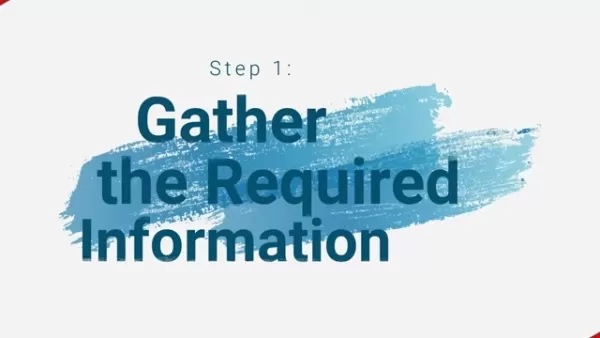 AI-Powered Cover Letters: Expert Guide for Journal Submissions
In today's competitive academic publishing environment, crafting an effective cover letter can make the crucial difference in your manuscript's acceptance. Discover how AI-powered tools like ChatGPT can streamline this essential task, helping you cre
AI-Powered Cover Letters: Expert Guide for Journal Submissions
In today's competitive academic publishing environment, crafting an effective cover letter can make the crucial difference in your manuscript's acceptance. Discover how AI-powered tools like ChatGPT can streamline this essential task, helping you cre
 US to Sanction Foreign Officials Over Social Media Regulations
US Takes Stand Against Global Digital Content Regulations
The State Department issued a sharp diplomatic rebuke this week targeting European digital governance policies, signaling escalating tensions over control of online platforms. Secretary Marco
US to Sanction Foreign Officials Over Social Media Regulations
US Takes Stand Against Global Digital Content Regulations
The State Department issued a sharp diplomatic rebuke this week targeting European digital governance policies, signaling escalating tensions over control of online platforms. Secretary Marco
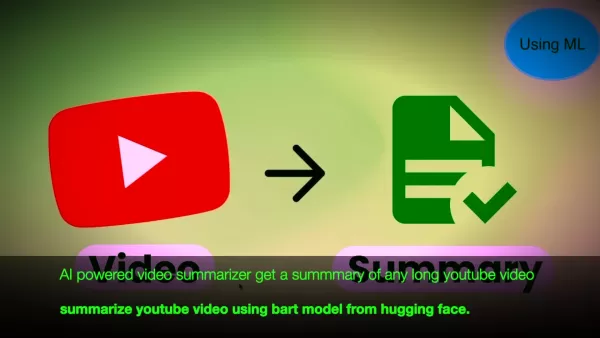 Ultimate Guide to AI-Powered YouTube Video Summarizers
In our information-rich digital landscape, AI-powered YouTube video summarizers have become indispensable for efficient content consumption. This in-depth guide explores how to build a sophisticated summarization tool using cutting-edge NLP technolog
Ultimate Guide to AI-Powered YouTube Video Summarizers
In our information-rich digital landscape, AI-powered YouTube video summarizers have become indispensable for efficient content consumption. This in-depth guide explores how to build a sophisticated summarization tool using cutting-edge NLP technolog
 September 25, 2025 at 8:30:37 PM EDT
September 25, 2025 at 8:30:37 PM EDT
스포티파이 팟캐스트 AI 보이스 번역 기능 진짜 유용하네요! 영어 팟캐스트 듣다가 자동으로 한국어로 번역되는 거 처음 경험했을 때 소름 돋았어요 ㅎㅎ 근데 아직 억양이 약간 어색한 부분이 있는 듯? 다음 업데이트에서 개선되길 바랍니다~


 0
0
 August 26, 2025 at 9:01:17 AM EDT
August 26, 2025 at 9:01:17 AM EDT
This AI voice translation stuff for Spotify podcasts is wild! Imagine listening to your favorite show in any language without missing a beat. But, gotta say, I wonder if it’ll ever capture the host’s vibe perfectly—accents and all. Still, super cool tech! 😎


 0
0
 August 8, 2025 at 9:00:59 AM EDT
August 8, 2025 at 9:00:59 AM EDT
AI voice translation for podcasts is wild! I love how it’s breaking down language barriers, but I wonder if it’ll ever capture the vibe of a host’s quirky accent perfectly. 🤔 Still, super cool for reaching global listeners!


 0
0
 April 24, 2025 at 10:45:43 PM EDT
April 24, 2025 at 10:45:43 PM EDT
SpotifyのポッドキャストのAIボイス翻訳は本当に便利です!世界中のポッドキャストを楽しむことができて嬉しいです。ただ、時々翻訳が少し機械的で自然さに欠けることがあります。でも、これはグローバルなポッドキャストファンにとって必須ですね!🎧🌍


 0
0
 April 24, 2025 at 2:14:43 AM EDT
April 24, 2025 at 2:14:43 AM EDT
Spotify 팟캐스트의 AI 음성 번역, 정말 대박이에요! 🌍🎙️ 제가 좋아하는 방송을 원하는 언어로 들을 수 있다니, 꿈만 같아요. 다만, 가끔 번역이 어색할 때가 있지만 그래도 너무 편리해요! 앞으로도 열심히 해서 더 자연스러운 번역을 기대할게요!


 0
0
 April 23, 2025 at 10:12:13 PM EDT
April 23, 2025 at 10:12:13 PM EDT
스포티파이 팟캐스트의 AI 음성 번역은 정말 혁신적이에요! 이제 언어의 장벽 없이 다양한 팟캐스트를 들을 수 있어서 좋습니다. 다만 번역이 가끔 로봇 같아서 좀 어색할 때가 있어요. 그래도 글로벌 팟캐스트 팬들에게는 필수죠! 🎧🌎


 0
0





























